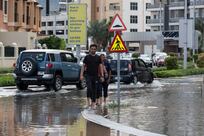ABU DHABI // Arabian Gulf countries should follow the UAE’s example and take in Syrian refugees, a Canadian cabinet minister says.
Ahmed Hasen, minister of immigration, refugees and citizenship, made his first visit to the UAE this weekand and commended the country for its plan to welcome 15,000 Syrian refugees by 2021 – 4,000 of whom will be the first batch to arrive.
Last November, Emirati officials flew to Ottawa to take part in a workshop aimed at welcoming refugees.
“We were very happy they came and we’re very pleased the UAE moved quickly to make a commitment to receive 15,000 refugees,” Mr Hasen said.
“We think that’s a really important and great step and an example for this region, so we commend the UAE for that and we’ll do whatever we can to continue to work with them on that programme.”
He said that Canadian officials had been helping the UAE with its refugee programme.
“It’s a priority,” Mr Hasen said. “As they implement it, we will have opportunities to work together. We are more than happy to provide our technical assistance and collaboration.”
Last September, Reem Al Hashimy, the Minister of State for International Cooperation, said 115,000 Syrians lived and worked in the UAE before the Syrian crisis erupted six years ago, while another 123,000 have been welcomed since.
“The number of refugees and displaced persons is the largest in modern history,” Ms Al Hashimy said at the time. “The UAE believes that we must not just meet the basic needs of refugees, we must also maintain their dignity and offer hope for their future.”
The UN High Commissioner for Refugees has said 4.8 million Syrian refugees fled to Turkey, Lebanon, Jordan, Egypt and Iraq, and 6.6 million are internally displaced within Syria.
Over the past six years, the UAE has provided more than US$750 million (Dh2.7 billion) to support Syrian refugees, who are mainly in neighbouring countries that are facing considerable pressure.
This year, Canada is expected to receive 40,000 refugees.
“The refugee crisis around the world and in the region is very acute,” Mr Hasen said. “Between the Middle East and Africa, we find the largest amount of refugees and migration in the world, so it’s particularly challenging.
“Every country that does a little bit more contributes to lessening the burden on other countries.”
He spoke of the UN Global Compact, a project that encourages businesses to contribute solutions to disruption in societies, and adopt sustainable and socially responsible policies.
“It needs to be signed by next year and more countries should share in the responsibility for the resettlement of refugees,” Mr Hasen said.
“Canada’s contribution is to increase the number of settlement spots available for refugees through the private sponsorship of refugees. We encourage the UAE to sign and a lot of the UN member states, I believe, will sign.”
The initiative is expected to help set the standard for refugee rights and find more durable solutions.
“Gulf countries can do a lot,” he said. “They can help with more resettlement, more resources.”
Dr Albadr Al Shateri, politics professor at the National Defence College, said the UAE was likely to take in more refugees.
“For Gulf states, it might be more practical to provide financial and logistical support for a third country to receive refugees, as the case in Jordan,” said Dr Al Shateri.
“As these countries [the GCC] have the wherewithal to support such humanitarian efforts, they should not shy away from shouldering such responsibilities. Culturally and religiously welcoming people seeking sanctuary is highly prized in the region.”
cmalek@thenational.ae





